

High School Transition: 29/11/2016, Behind the News. As the school year winds up, we know a big proportion of our audience will be thinking about the nerve-racking move to high school next year.
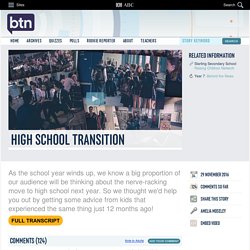
So we thought we'd help you out by getting some advice from kids that experienced the same thing just 12 months ago! TRINITY: I think high school's gonna be fun, but scary at the same time. I feel like I'm going to be the small fish with all these big fish around me. PORTIA: Being in primary school, you're like the oldest and then going into high school, you'll be the youngest. WAYDE: I think high school's gonna be difficult and challenging because it's something new. ANNIK: I'm really looking forward to PE and science cause there's going to be more experiments and I like doing experiments. TRINITY: The thing I'm gonna miss the most is my friends cause I'm the only one going to the high school I'm going to. OLIVIA: All the teachers, just cause we've known them for so long and all the subjects cause we're doing different ones. Campaign.kidsmatter.edu. Family school partnerships framework.
Advice for New Principals: Value Your PTO - PTO Today. It's principal-hiring season in many school districts, as leaders retire or move on to new positions.
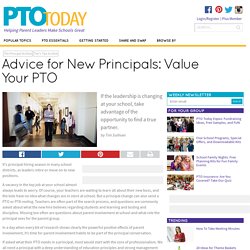
A vacancy in the top job at your school almost always leads to worry. Of course, your teachers are waiting to learn all about their new boss, and the kids have no idea what changes are in store at school. But a principal change can also send a PTO or PTA reeling. Teachers are often part of the search process, and questions are commonly asked about what the new hire believes regarding students and learning and testing and discipline. Missing too often are questions about parent involvement at school and what role the principal sees for the parent group. In a day when every bit of research shows clearly the powerful positive effects of parent involvement, it’s time for parent involvement habits to be part of the principal conversation. If asked what their PTO needs in a principal, most would start with the core of professionalism.
No one cares about our children more than we do, dear Mr. How to get new volunteers involved in school fundraising - Mouths of Mums. Do you look around at your school fundraisers and fetes only to see the same faces year in, year out?
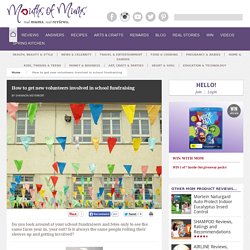
Is it always the same people rolling their sleeves up and getting involved? Don’t believe this is any different to other products? TRP_Schools Brochure_A4 (email) What is the best way to gain genuine, active parental engagement? < Teaching Channel. 6 effective ways to stop bullying and teach kindness to kids. How do you teach kindness, acceptance and empathy to kids?
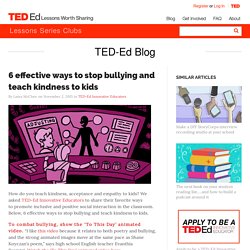
We asked TED-Ed Innovative Educators to share their favorite ways to promote inclusive and positive social interaction in the classroom. Below, 6 effective ways to stop bullying and teach kindness to kids. To combat bullying, show the ‘To This Day’ animated video. “I like this video because it relates to both poetry and bullying, and the strong animated images move at the same pace as Shane Koyczan’s poem,” says high school English teacher Evanthia Poyiatzi. Watch the ‘To This Day’ animated video here. Edutopia. Technology provides today’s students with an infinite number of distractions; mobile devices have literally put texting, Facebook, and addictive games at their fingertips.
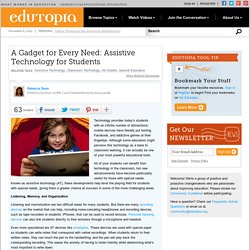
Although some educators might perceive this technology as a bane to classroom learning, it can actually be one of your most powerful educational tools. All of your students can benefit from technology in the classroom, but new advancements have become particularly useful for those with special needs. Known as assistive technology (AT), these developments help level the playing field for students with special needs, giving them a greater chance at success in some of the more challenging areas. Listening, Memory, and Organization Listening and memorization are two difficult areas for many students. Even more specialized are AT devices like smartpens. Edutopia. Educators going back into classrooms right now will face a dizzying array of learners looking up at them.
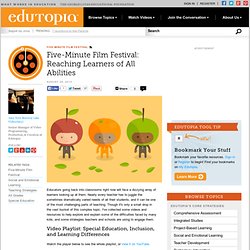
Nearly every teacher has to juggle the sometimes dramatically varied needs of all their students, and it can be one of the most challenging parts of teaching. Though it's only a small drop in the vast bucket of this complex topic, I've collected some videos and resources to help explore and explain some of the difficulties faced by many kids, and some strategies teachers and schools are using to engage them. Watch the player below to see the whole playlist, or view it on YouTube. Teach Special Education (05:33) This moving call-to-action video from Teach.org surfaces the voices of the spectrum of kids, parents, and educators that are touched by the world of special education.
Edutopia. Getting Started Whether low-tech, high-tech, or somewhere in between, assistive technology and related services play an important role in reducing barriers to learning for students with a variety of special needs and challenges.
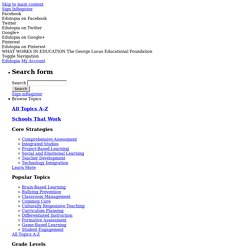
Edutopia. His nickname was "seizure boy" -- not a nickname he welcomed or ever wanted.
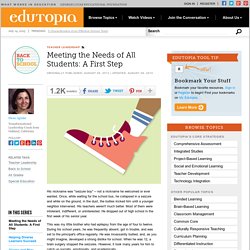
Once, while waiting for the school bus, he collapsed in a seizure and while on the ground, in the dust, the bullies kicked him until a younger neighbor intervened. His teachers weren't much better. Most of them were intolerant, indifferent, or uninterested. Thinkuknow Youth. Skip to content Resize text: A- A+ Search form Welcome to the ThinkUKnow Australia youth site!
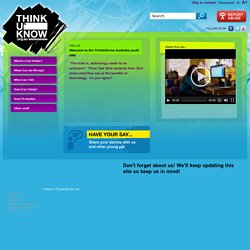
"The truth is, technology needs to be embraced. " Three Year Nine students from QLD share what they see as the benefits of technology. Catholic Education Melbourne. Parents and families are the first educators of their children.
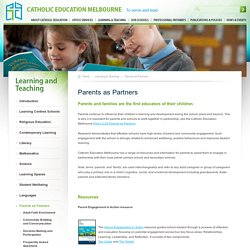
Parents continue to influence their children’s learning and development during the school years and beyond. This is why it is important for parents and schools to work together in partnership, see the Catholic Education Melbourne Policy 2.25 Parents as Partners. Research demonstrates that effective schools have high levels of parent and community engagement. Such engagement with the school is strongly related to enhanced wellbeing, positive behaviours and improved student learning. Catholic Education Melbourne has a range of resources and information for parents to assist them to engage in partnership with their local parish primary school and secondary schools.
Establishing A Culture Of Collaborative Learning With Teachers. This is the first in Kristin Gray’s Getting Better Together series, Establishing A Culture of Collaborative Learning. Kristin and all the Teaching Channel Laureates are going public with their practice and seeking support in getting better from colleagues and the Tch community. I’m an extremely curious person. I find so many things within teaching wonderfully interesting and thought-provoking, that I view my job as much about being a learner as I do about being a teacher.
While I value all the things I still want to learn more about, learning as a teacher takes time and can be messy. Edutopia. I made a good number of blunders my first year teaching that still make me cringe. I learned though. And it's fair to say, when it comes to managing a classroom, most of what we learn as new teachers is trial by fire. It's also smart to heed the advice of those who have walked -- and stumbled -- before you. If you are struggling with discipline, here are five tips that you can start using right away: #1 Use a normal, natural voice. Edutopia. With daily news reports about the devastating impact on students who have been relentlessly bullied, teachers find themselves on the front line in addressing bullying and intolerance. It is time to move into action.
Edutopia. Pamela Randall: Social-emotional skills are the essential skills for success in school, work and life. Natalie Walchuk: Social-emotional learning centers their mind and body. It reduces their emotional tension, so they can be open to new content and material. We find that academic outcomes increase exponentially when students are nurtured, loved and cared for. That we get much more out of them when we first address social-emotional needs. Edutopia. We would never let a teacher or coach physically strike or sexually molest our child. Why then do we allow teachers and coaches to bully our children? There are three major reasons why this occurs: Sexual and physical abuse can be documented on the body and are in the criminal code. The law takes them seriously, therefore so do parents.
In contrast, emotional abuse is not in the criminal code, so it can still be confused with "motivation" -- especially in the education system. Edutopia. Each October, individuals and organizations nationwide work together to raise awareness of bullying during National Bullying Prevention Month, an initiative of the PACER Center. How to Cultivate a Bully-Free Community. Fifth grade student Malcolm Lyon is especially tall for his age and well-spoken. Home - You Can Do It! Parents. 7 great resources for World Mental Health Week - Ara Sarafian - ABC Splash - Mental illness will affect nearly all of us in some way. Almost half of us will experience it personally. For young Australians it's responsible for the majority of health problems. Here are some of the resources on Splash that can help you get mental health conversations started in the classroom or at home with kids.
Why meditation should be taught in schools. New research in the fields of psychology, education and neuroscience shows teaching meditation in schools is having positive effects on students' well-being, social skills and academic skills. A recent meta-review of the impact of meditation in schools combined the results from 15 studies and almost 1800 students from Australia, Canada, India, the UK, the US and Taiwan. A Cornucopia Of Useful Social Emotional Learning Resources. Wellbeing for schools. Culturally Responsive Teaching Starts With Students. Culturally Responsive Teaching Starts With Students by Dr. Matthew Lynch, Dean of the School of Education, Psychology, & Interdisciplinary Studies at Virginia Union University A multicultural society is best served by a culturally responsive curriculum. Four Tools to Improve Communication Between Home and School. Kindergarteners Talk About Mindfulness in "Just Breathe" Short Film.
Morning Meeting Visits: Sharing Ideas and Insights. Homework vs. No Homework Is the Wrong Question. The real question we should be asking is, "What do we believe should happen after the end of the school day to help ensure that students retain what they have learned and are primed to learn more? " Any answer with the word, "work" in its name, as in "homework," is not typically going to be met with eagerness or enthusiasm by students. Resilience and Grit: Resource Roundup. What Students Remember Most About Teachers. For parents. Use EdPuzzle to Flip the Classroom Effectively or differentiate your class.
Home - eSmart Digital Licence. Building Resilience: A Model to Support Children and Young People. Being Me. Harmony Day. Three things all teachers need. Meet 4 Teachers Who Took Classroom Design to the Next Level. SCHOOL CLIMATE. Simple Ways to Cultivate Happiness in Schools. How Are Happiness and Learning Connected? Topics: First Weeks of School. Family Connections: 10 Minutes You Don't Want to Skip. Tribes Learning Community - A New Way of Learning and Being Together. Start of the Year Activities. Catching Readers Before They Fall. To Improve School Climate, Examine Recess. Literature Guides. Student Engagement: Resource Roundup. Visible Thinking. Do you know me well enough to teach me?* The 8 Minutes That Matter Most. Active, Engaging Test Prep: The Walking Quiz. The importance of being present. Parent Engagement in a Future Ready School. 7 Things to Try Before You Give Up On A Student.
Kindness Project for Children and Adults of All Ages. Inclusion Quality Mark. Curriculum and Resources. News. Primary Schools - Achievement Program. Being Me. Free and easy ways to connect with your staff & parents! What Do Emotions Have to Do with Learning? A Collection Of “The Best…” Lists On Parent Engagement. YouTube. StopBullying.gov. 12 Conversation Starters on What Parents Want You (Teachers) to Know. Moving Beyond The Newsletter: Using Technology To Meet Parents Where They Are. Internet Catalogue. The Toolkit for Parent Involvement that Makes a Difference. Wellbeing Australia. Empowering Grassroots Student Activism. Simple Ways to Cultivate Happiness in Schools. Interactive Learning Modules. How Are Happiness and Learning Connected?
Dear Teacher – The PROMISE Poem. Purposeful Downtime. My Best Posts On Building Parent Engagement In Schools — 2012 (Part Two) Student_engagement_literature_review_2011. Alberta Education - Student Engagement. The Best Videos Illustrating Qualities Of A Successful Language Learner. Holistic Teaching: Why Educators & Student’s Emotional Well-Being. Responsive Classroom. 25 Resources For Social Emotional Learning. Tribes Learning Community — A New Way of Learning and Being Together. 5 iPads For Social And Emotional Learning. Technology-Enhanced Social-Emotional Activities - Home. Social & Emotional Learning. Knapp's Family Engagement Wiki - ResourcesForParents_Newtown. The Best Resources On Talking With Children About Tragedies.
Prep for Parents. Safer Internet Day 2012: Connecting generations and educating each other.